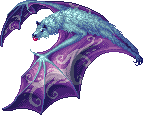Viewing lajeN

Father: Unknown
Unknown Pedigree
Hardiness: 8
Appearance: 7
Emerged: 13:16 14.12.2024
Matured: 7:59 16.12.2024
During their yearly migration from the arctic taigas to more temperate forests, Bera Mangantos travel during the day rather than at night to take advantage of the sun’s lingering warmth. Their soft, dense fur traps body heat, helping to stave off the cold temperatures, and they prefer to roost in small caves or hollow trees where they can huddle close together. Fruits, berries, and insects make up the majority of their diet, and males will often bring their mates the biggest, juiciest berries they can find, especially during their short breeding season. Nursing females remain in the roost to care for their offspring while the others in the colony hunt. Once the pups are weaned and capable of flying on their own, they quickly learn to forage for themselves and will follow their parents as the colony migrates back to the north. Although their return trip is done in warmer temperatures, it is not uncommon to spot a Bera Manganto colony flitting past in the early dawn or late dusk.
The creatures that dwell in this rather desolate world still display some diversity in appearance, eating habits, and social behavior. Whether they have fur or feathers, skin or scales, their unique genetic makeup allows for a variety of colors and markings within each species. Despite limitations in food sources, herbivores, omnivores, and carnivores are all present in the food chain, and each species requires specialized care within a laboratory. Although the artificial setting of housing units and breeding pods precludes most opportunities to study true interspecific behavior, the interactions within and between species has been studied extensively in the wilderness by scientists daring enough to venture beyond the outpost’s walls.
